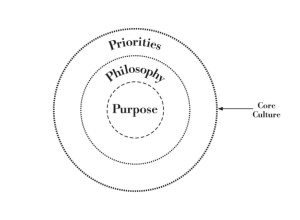Should you conduct a culture assessment?
Is it time to conduct a culture assessment? Before answering this question, think about how employees in your organization would respond to these questions?
- What is the purpose of our organization?
- Why is the work we do important?
- What makes our company distinctive from our competitors?
- What should we focus on and pay attention to in order to ensure that we thrive?
Imagine the impact the organization could have if everyone answered these questions similarly. No, it would not mean you are a company of clones. Instead, it would mean that employees have a clear and shared purpose and are guided by a set of principles and values. What it would mean is that if your company prides itself in providing wow service or heartfelt caring or whatever is core to your company, then employees would be practicing those principles.
For example, picture a hospital where everyone genuinely valued safety, and they consistently practiced the simple act of washing their hands to ensure the safety of patients. Or picture a technology company that prides itself in design, and employees consistently design the most amazing products. Or picture a company that prides itself in customer service, and employees seek to not only service their customers, but also build personal connections with them. This focus and drive does not just happen. It requires a shared understanding of why the organization exists and its distinctive character.
 Conducting a culture assessment is a process for uncovering the company’s core culture. Above all, top leadership must be committed to and lead the assessment process. And by including all employees in the process, the culture that unfolds is one that unites everyone and motivates aligned action.
Conducting a culture assessment is a process for uncovering the company’s core culture. Above all, top leadership must be committed to and lead the assessment process. And by including all employees in the process, the culture that unfolds is one that unites everyone and motivates aligned action.
Use a culture assessment to identify the company’s Purpose
More and more, companies are taking the time to reflect on who they are as an organization using a culture assessment. Firstly, they identify the company’s Purpose. Research suggests that people want to make a difference through their work. And focusing on Purpose rather than just profits builds business confidence and drives investment (2014 Deloitte Core Beliefs & Culture Survey). Business leaders report the value of purpose in driving performance. In organizations whose Purpose drives action, leaders “reported a greater ability to deliver revenue growth and drive successful innovation and ongoing transformation” (The Business Case for Purpose, EY Beacon Institute and Harvard Business Review Analytic Services). In addition, research (Korn Ferry global survey of 1,045 executives in May 2016) states that “focus on both personal and organizational purpose is key to productivity and financial success.”
Use a culture assessment to identify the company’s core values
In addition to Purpose are the organization’s core values. The values serve as guidelines for how employees do their purpose-driven work. If employees are not part of the process for defining those values, they may not be as dedicated to living them.
Core values must be genuine. They are more than a list of nice sounding attributes to put on the website or on the lobby wall. Core values are beliefs that everyone shares, commits to, and lives by.
Use your distinctive culture to build a workplace that thrives
Successful leaders know the power of organizational core culture. They unite employees around a small, compelling set of principles and values that generate business success. Employees understand what is core and distinctive to their organization, vendors get it, and customers love it. With an understanding of core culture, you can create a workplace where people are doing the right work in an organization where they have a real sense of connection and belonging. The results: a thriving and dedicated workforce and a highly successful organization.
Contact Sheila if you have questions
 For more information on conducting a culture assessment, contact Sheila. Use the contact form to email her.
For more information on conducting a culture assessment, contact Sheila. Use the contact form to email her.
This site uses Akismet to reduce spam. Learn how your comment data is processed.
Leave a Reply